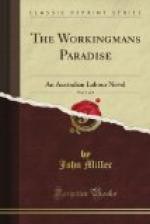of the voteless workers in the Queensland bush.
The companions of her childhood were to be Gatling-gunned
because of the squatters, whose selfish greed and
heartless indifference to all others had made them
hateful to this selector’s daughter. Because
the bushmen would not take the squatters’ wage
and yield his liberty as a workman to the squatter’s
bidding and agree to this and to that without consultation
or discussion, the scum of southern towns and the
sifted blacklegs of southern ‘estates’
were to be drafted in hordes to Queensland to break
down the unionism that alone protected the bushman
and made him more of a man than he had been when the
squatter could do as he would and did. From the
first days she could remember she had heard how the
squatters filched from the bushmen in their stores
and herded the bushmen in vile huts and preferred
every colour to white when there were workers wanted;
and how the magistrates were all squatters or squatters’
friends and how Government was for the squatters and
for nobody else on the great Western plains; and she
knew from Ned of the homeless, wandering life the bushmen
led and how new thoughts were stirring among them
and rousing them from their aimless, hopeless living.
She knew more, too, knew what the bushman was:
frank as a child, keeping no passing thought unspoken,
as tender as a woman to those he cared for, responsive
always to kindly, earnest words, boiling over with
anger one moment and shouting with good humour the
next, open-handed with sovereigns after months and
years of lonely toiling or sharing his last plug of
tobacco with a stranger met on the road. His
faults she knew as well: his drunkenness often,
his looseness of living, his excitability, all born
of unnatural surroundings; but his virtues she knew
as well, none better, and all her craving for the scent
of the gums and to feel again the swaying saddle and
to hear again the fathomless noon-day silence and
to see again the stock rushing in jumbling haste for
the water-hole, went out in a tempestuous sympathy
for those who struggled for the union in the bush.
And Ned! She hardly knew what she thought about
Ned.
She was unjust in her thoughts, she knew, not altogether
unjust but somewhat. There had been heroism in
the passive struggle of six months before, when the
seamen left the boats at the wharves for the sake of
others and when the “lumpers” threw their
coats over their shoulders and stood by the seamen
and when the miners came up from the mines so that
no coal should go to help fight comrades they had
never seen. Her heart had thrilled with joy to
see so many grip hands and stand together, officers
and stewards and gasmen and lightermen and engine-drivers
and cooks and draymen, from Adelaide to far-off Cooktown,
in every port, great and small, all round the eastern
coast. As the strike dragged on she lived herself
as she had lived in the starving hand-to-mouth days
of her bitter poverty, to help find bread for the




